In Some Evangelical Circles, Grown Men Pursuing Teens Isn't All That Unusual
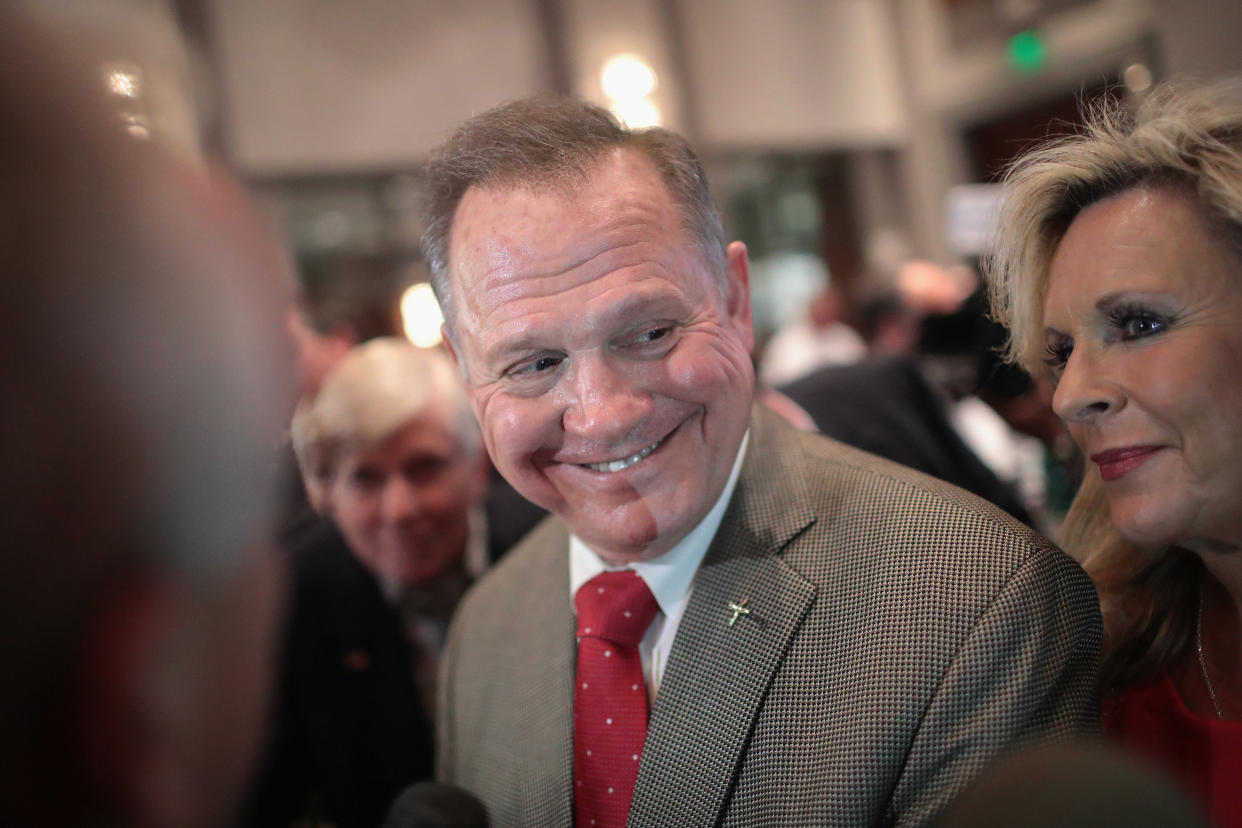
In the fundamentalist Christian circles that Samantha Field grew up in, the word “courtship” doesn’t evoke romantic images of men and women batting eyelashes at each other in a parlor, or writing love poetry by candlelight.
Rather, in these communities, “courtship” refers to an intricate set of rules and practices intended to help young people find godly, parent-approved spouses. While it’s meant to be beneficial and holy, this practice of courtship can also result in abuse ― particularly when it gives older men an opportunity to prey on much younger teen girls.
Field is a writer, seminarian and ex-fundamentalist Christian who attended several Independent Fundamental Baptist churches in Florida and other parts of the South as a child. In those communities, she says, a significant age difference among couples was seen as ideal for allowing men and women to carry out their God-given duties ― the husband to provide and lead, and the wife to run the household and give birth to many children.
While the ideal age for girls to get married was 16 or 17, Field said that “below 16 wouldn’t be unusual.”
“Younger than 15, people would probably start raising their eyebrows a little bit, but just a little bit. If they knew the couple personally, they probably wouldn’t have a problem with it,” she said. “They’d think, this is so godly and God-led.”
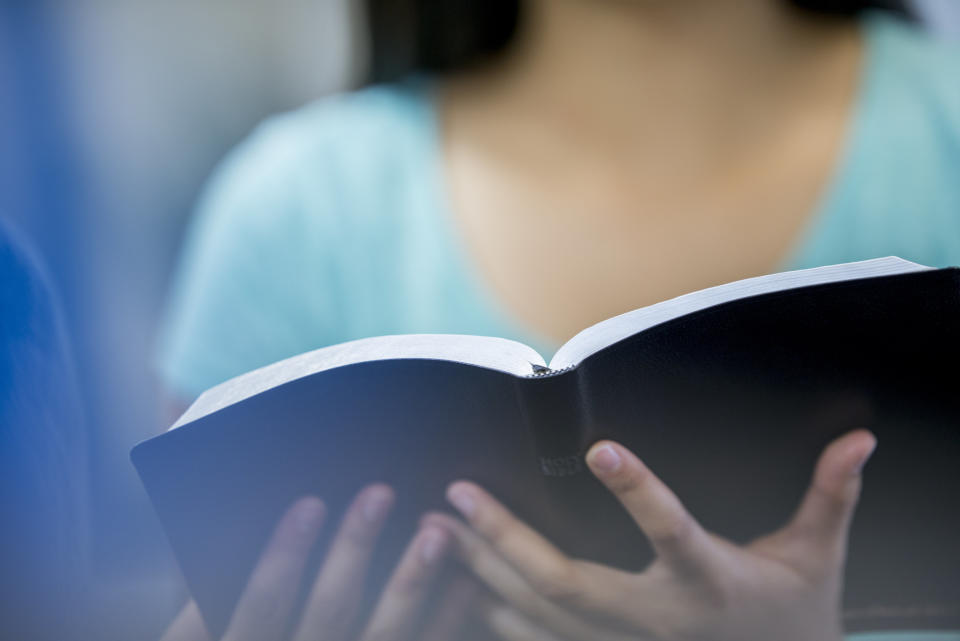
Evangelical Protestants, the largest Christian religious group in the U.S., generally believe the Bible is the inerrant word of God. Fundamentalist Christians, who tend to hold even stricter and more literalist views of the Bible, represent only a tiny subset of American evangelicalism. But the relationship practices ― and the marital age gap ― sanctioned by some fundamentalists are coming under scrutiny amid the sexual abuse allegations lodged against Roy Moore, the Republican candidate and evangelical Christian vying to become Alabama’s next senator.
Five women have accused Moore of pursuing them sexually when he was in his 30s and they were teens. One of the most troubling accusations against Moore came from Leigh Corfman, who told The Washington Post she was just 14 years old when a 32-year-old Moore sexually assaulted her.
Moore has repeatedly denied the allegations, claiming they are politically motivated. The accusations have set off a firestorm ahead of Alabama’s special election, scheduled for Dec. 12, to fill Attorney General Jeff Sessions’ former Senate seat. A number of prominent Republicans have called on Moore to leave the race. But other conservatives are standing behind the former judge ― and some onlookers suspect that evangelical voters will still support him, just like they stood by Donald Trump after abuse allegations against him emerged before the 2016 presidential election.
Alabama state Auditor Jim Zeigler went so far as to claim there’s nothing “immoral or illegal” about a man in his 30s pursuing a teenage girl. He turned to Scripture to justify his reasoning.
“Take the Bible. Zachariah and Elizabeth for instance. Zachariah was extremely old to marry Elizabeth and they became the parents of John the Baptist,” Zeigler told The Washington Examiner last week. “Also take Joseph and Mary. Mary was a teenager and Joseph was an adult carpenter. They became parents of Jesus.” (Evangelical Christian leaders have largely bristled at this logic, and said they do not condone relationships between young teens and much older men.)
Moore is a Southern Baptist, part of a diverse evangelical denomination that is America’s largest Protestant grouping. While they are conservative, Southern Baptists are largely not considered to be fundamentalist Christians. But some ex-fundamentalists argue that the line distinguishing fundamentalists from more mainstream evangelicals is blurrier than it initially appears ― and that in some Christian circles, grown men pursuing teenage girls, as Roy Moore is accused of doing, isn’t really that unusual.
Abusers exist in all types of communities, of course. They’re found among people of every kind of faith and people of no faith at all. And to be clear, Moore has been accused of undressing a teenage girl in a private setting, and using physical force to try to initiate sexual contact ― behavior that falls well outside the chaste, parent-sanctioned practices of traditional fundamentalist courtship.
But some former fundamentalists argue that the theology they grew up with ― a theology that justifies wide age gaps among couples, shames women for being sexually active before marriage and enforces strict gender norms ― is part of a broader problem conservative Christians need to address. And they’re wondering whether conservative ideas about gender and marriage have helped contribute to an environment where some Alabamians and advocates are dismissing the women’s allegations and making excuses for Moore.
But people I knew when I was 14 would speak with pride about friends, sisters, and daughters around my age *courting* men in their late teens to late 20s. "He's a godly young man! He's serious about marriage! This is what we've prayed for!" /3
— Amethyst Marie (@AmethystMarieTM) November 10, 2017
Courting With Marriage (And Parents) In Mind
Courtship, as it’s practiced in some fundamentalist communities, is a way for Christian parents to help arrange their children’s marriages, vet potential partners and make sure their children end up in happy and godly relationships.
Field describes courtship in fundamentalist churches as a process directed by men. The process varies in different communities and from family to family, but it tends to follow a basic pattern. A man is considered ready for marriage when he has a stable source of income, and perhaps his own home ― essentially, when he is able to financially support a family. A woman, meanwhile, is considered ready when she is able to have children and take care of a household.
The man, once ready (and sometimes after receiving counsel from his own parents and pastor), approaches the woman’s father to ask permission to begin courting his daughter. The courting couple can then start interacting, but usually in public and never alone. The process is closely monitored by the parents and siblings.
Fathers in particular sometimes take a prominent role in the relationship between a courting couple. The father might be the one making decisions about what his daughter can wear during the courtship and how the couple can interact.
Field said that in the communities where she grew up, age differences between a man and a woman aren’t viewed as a negative thing. In fact, they’re often considered ideal. An older man is thought to be financially and emotionally capable of leading a household, while a teen girl is more of a blank slate. She’s assumed not to have habits or preferences of her own yet. Her purpose in life becomes learning how to be her husband’s wife.
“Everyone assumes it is a good idea for a girl to marry a man at least 10 years her senior, because that way he’s established,” Field said. “He has a job and all that.”
Kathryn Brightbill is a legislative policy analyst at the Coalition for Responsible Home Education, a nonprofit advocating for the interests of home-schooled children. Her family attended mainstream evangelical churches when she was a child, but she was exposed to fundamentalism through the Christian home schooling movement and through her involvement in the anti-abortion movement in the 1990s.
We should probably talk about how there is a segment of evangelicalism and homeschool culture where the only thing Roy Moore did wrong was initiating sexual contact outside of marriage. 14 year old girls courting adult men isn't entirely uncommon.
— Kathryn Brightbill ✒ (@KEBrightbill) November 10, 2017
Brightbill told HuffPost that young marriage is encouraged in some Christian communities because marrying young reduces the chance of people having sex outside of marriage, and increases the possibility of having more children. (These communities don’t have a monopoly on encouraging young marriage for religious reasons, of course; the same thing can be found in certain Jewish and Muslim traditions.)
“A lot of people in the communities where young courtship happens believe that adolescence is a modern social construct, and that you’re either a child or an adult, with no intermediate ground,” Brightbill said. “The average home-school girl can run a household in her mid-teens, but men aren’t set in a career that could support a wife and family until their late teens to early 20s at the youngest. That automatically creates a tendency towards an asynchronous age matchup.”
An American Problem
Ashley Easter is a writer, home-school alum and advocate for abuse victims. She was raised in an Independent Fundamental Baptist church in Virginia. She didn’t know any parents in her childhood religious community who advocated for their daughters to be married early. But such stories have emerged among the networks of former Christian homeschool alumni she’s involved with.
“Men are often seen as breadwinners and might need to be much older and be established to take care of a family, particularly one that may have a lot of children,” she said. “And a girl, she may only have the responsibility of having children and keeping a house. And if a girl can do that by the time she’s 14, I can see how someone could draw the conclusion that she’s ready for marriage. But that’s wrong in my perspective.”
Although rare, child marriage isn’t unheard of in the U.S. Some states have exemptions that let children younger than 18 get married with parental consent.
According to data compiled by the child marriage prevention organization Unchained at Last, more than 200,000 minors ― that is, people younger than 18 ― got married in the U.S. between 2000 and 2015. Only 14 percent of them were wed to other minors. Sixty percent married adults between the ages of 18 and 20, and 25 percent married adults between 21 and 23.
Easter personally defines child marriage as any marriage that involves someone younger than 18.
“If you can’t vote in an election, how can you vote for who your life partner is going to be?” she asked.
Love HuffPost? Become a founding member of HuffPost Plus today.

Victims of child marriage are often exposed to sexual abuse and coercion, financial abuse and mental abuse. Easter said she’s not opposed to women getting married to much older men. In fact, there’s a significant age gap in her own marriage. But she was able to make this decision as an adult.
“I could make that choice without coercion, and more life experience,” she said. “My understanding is if a woman or girl marries as a child, domestic violence rates are generally much higher for her. She won’t have the experience and knowledge to reach out and get help as easily.”
Courtship’s Ties To Purity Culture And Complementarianism
Courtship practices evolve from the demands of “purity culture,” which emphasizes sexual abstinence and emotional purity before marriage. In some conservative Christian circles, virginity ― particularly a woman’s virginity ― is fetishized to the point where fathers pledge to protect their daughters’ chastity with purity balls and with purity rings.
Courtship is also often informed by complementarianism, the conservative Christian idea that men and women have different, distinct, God-given roles. The principle can be traced to a passage in the Bible’s Book of Ephesians. The general idea is that a wife should submit to her husband “in everything,” while a husband should be willing to serve and sacrifice for his wife in the way that Christ served the church ― going so far as to lay down his life.
Brightbill said that in the religious communities she was raised in, this call for submission was translated quite literally. Women were expected to submit, first to their fathers and then to their husbands.
“Men are providers and women stay home, have babies, and take care of the children, and it’s believed that this is the natural order that God created and to step outside of that order is sinful,” she said. “Marriage is for procreation, with the secondary purpose of preventing people from sinning by having sex outside of marriage.”
Courtship is only one of the ways that fundamentalist Christians use literal interpretations of the Bible to navigate family relationships and decisions about sex. Other families might be part of the Quiverfull movement, which shuns contraception, or the stay-at-home daughter movement, which encourages daughters to submit to their fathers until marriage.
It’s hard to track how influential and widespread courtship is, partly because fundamentalist Christianity itself often crosses denominational boundaries. Individual families within a larger church context can be independently inspired to follow certain fundamentalist teachings. So, for example, not all Independent Fundamental Baptist churches are supportive of teen marriages through courtship ― and likewise, some families within a larger Southern Baptist church could subscribe to a theology that justifies these marriages.
“The people I knew who supported young courtship and child marriage were in a range of denominations and non-denominational churches,” Brightbill said.
Easter said it’s subtle how these movements find support in various denominations.
“It’s the type of thing that could slip into a lot of different church settings,” she said. “While an entire church may not endorse that kind of thing, or even particular families in the Quiverfull movement might not advocate for child marriage, it can slip in pretty much anywhere.”
“I don’t know anyone personally who married as a child,” she said. “But I could certainly understand how some of the logic in purity culture and the ideas around a woman’s virginity could lead to some families coming to that conclusion.”

How Courtship Has Seeped Into The Wider Evangelical Church
The principles that inform courtship ― the ideas about gender, sex and complementarian relationships ― are not exclusive to fundamentalist Christians.
In 1997, courting gained a following in the wider evangelical community thanks to Joshua Harris’ book I Kissed Dating Goodbye. Harris, who was just 21 at the time, argued that traditional dating violated God’s plans for a holy marriage. He encouraged Christian singles to entrust their love lives to God and to their parents. He urged his young readers to practice courtship, albeit a more relaxed version than the one fundamentalists were following.
Harris made saving sex for heterosexual marriage seem holy, even wildly romantic ― and the book became something of a phenomenon in evangelical circles. (Harris himself has admitted he now has mixed feelings about its legacy.)
After I Kissed Dating Goodbye, Brightbill says, casual dating without marriage in mind became much less common in the evangelical world. Some major evangelical leaders may not support courtship the way it was practiced in the fundamentalist communities of her childhood, but she says she hasn’t heard those leaders condemning it outright.
The ideal for evangelicals, she said, is still “chaste courtships with nothing more than side hugs or hand holding before the first kiss at the altar on the couple’s wedding day.”
“There’s a lot more overlap than I think a lot of major evangelical figures would like to admit,” she said.
In response to the allegations against Moore, some evangelical leaders have protested that there is a stark difference between young marriage and child molestation.
Ed Stetzer, an evangelical writer and executive director of Wheaton College’s Billy Graham Center, said that bringing a biblical story about Joseph and Mary into a modern-day allegation about child molestation is “ridiculous and blasphemous.”
“Jim Zeigler needs to read his Bible quite differently,” Stetzer wrote at Christianity Today last week. “And to all you reporters out there, THIS IS NOT WHAT EVANGELICALS BELIEVE.”
Russell Moore, president of the Ethics and Religious Liberty Commission of the Southern Baptist Convention (and no relation to Roy), expressed dismay over the equivocation coming from some conservatives.
Christian, if you cannot say definitively, no matter what, that adults creeping on teenage girls is wrong, do not tell me how you stand against moral relativism.
— Russell Moore (@drmoore) November 13, 2017
Child marriage is certainly not widespread in mainstream evangelicalism. But Brightbill says it’s worth acknowledging that a small segment of the church finds nothing immoral about an older man pursuing and grooming teen girls.
“One of the reasons those who practice early courtship consider it OK for adult men to be courting teenage girls is because they’re not supposed to be having sex before they’re married,” Brightbill said. “The people who are practicing early courtship and child marriage are careful to make sure that they’re not technically breaking any laws, even though for all practical purposes, it’s parent-sanctioned grooming of underage girls in preparation for them to hit legal age.”

The Need For Protestant Churches To Address Sexual Abuse
Catholic churches in the United States have been dealing with allegations of sexual abuse against minors for decades. The problem hasn’t gotten as much attention in Protestant American churches. But it still exists.
Hundreds of child abuse accusations against Protestant clergy, church staff members, volunteers or congregants emerge every year, according to data compiled by the three companies that insure a majority of Protestant churches.
But Protestant churches haven’t responded adequately to the allegations, according to Boz Tchividjian, a former child sex abuse prosecutor who is active in the movement to educate evangelical churches and leaders about preventing sex abuse.
“Protestants have responded much worse than the Catholics to this issue,” Tchividjian told The New Republic this year. “One of the reasons is that, like it or not, the Catholics have been forced, through three decades of lawsuits, to address this issue. We’ve never been forced to deal with it on a Protestant-wide basis.”
Easter, who is also active in the educational movement, said evangelical churches have a lot of work to do in terms of how they respond to sexual abuse allegations.
“I would say that churches often side with the alleged predator over the victim. I think a lot of that comes down to power, control, and reputation management,” Easter said. “It’s much easier to believe a powerful perpetrator than to believe a powerless victim.”
The principle of complementariansm, while not always inherently destructive, can sometimes lead to abuse, Easter said. Some evangelical couples who are complementarian in word and practice can still have equal relationships. But the system gives men the final say, which inevitably creates an unequal power dynamic.
“When we have this idea that men and women have different roles, and when those roles include somebody having power and control over the other, that relationship gets quickly dangerous,” she said. “I wouldn’t say that everyone who is complementarian is abusive, but I would say that the structure of complementarianism is abusive, because abuse is always motivated by a lust for power and control, and a system of patriarchy. It’s somebody having a final say and final authority. When you have a system like that, somebody is always going to have less of a say and not going to have full autonomy.”
Easter said it’s important for evangelical churches to work on equality for men and women ― within the context of marriage, but also in the home, in church and in society at large.
“Not all who identify as evangelical hold to extremist views, and certainly most would not advocate for child marriage, but we cannot use the ‘no true Scotsman fallacy’ and say these dangerous views don’t exist at all within evangelicalism,” she said. Evangelicals, she added, need to self-evaluate and “ask how some of their doctrines might be used to justify or excuse these dangerous behaviors.”
Also on HuffPost
Rev. Jennifer Bailey
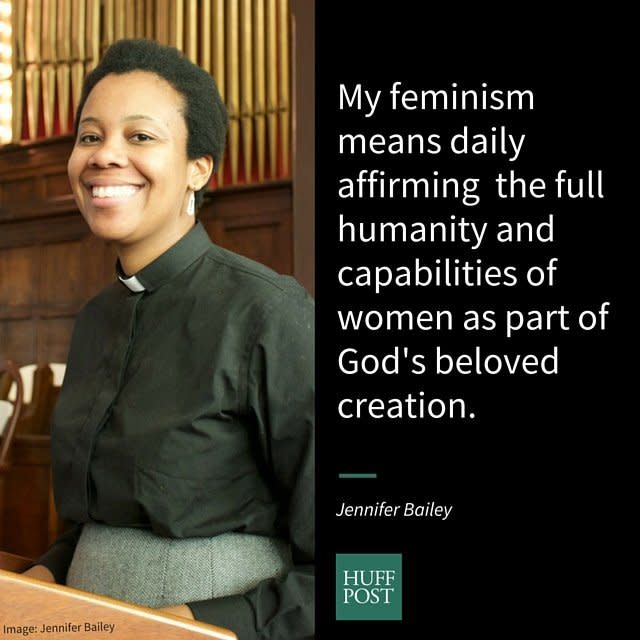
"As a Christian leader, my feminism means daily affirming the full humanity and capabilities of women as part of God's beloved creation and their sacred work in the world. It also means honoring the sacrifices, courage and labor of the many female saints of God that it made it possible for me to wear my clerical robe and preach the gospel of Jesus. Historic figures like Jarena Lee, Harriet Tubman, Sojourner Truth and Bishop Vashti Murphy McKenzie paved the way for me as did the unsung (s)heroes and everyday church mothers whose work has kept the church alive and flourishing since its inception. We still have a long way to go to completely shatter the stained glass ceiling but the ancestors have shown is it is possible by holding to God's unchanging hand. Blessed be her Holy Name."
Sarah Bessey
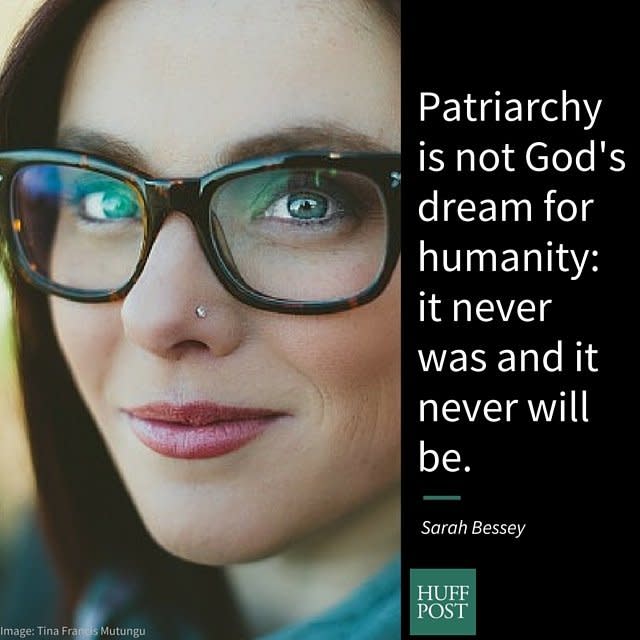
"It was following Jesus that made a feminist out of me! That discipleship lead me to caring about everything from maternal health in Haiti to sexism in the Church as issues of justice close to God's heart. Patriarchy is not God's dream for humanity: It never was and it never will be. I remain hopeful, too - more and more people are waking up to what wholeness and peace-making can look like for both men and women in the Kingdom of God which changes things on both a small personal scale but also helps to move the needle forward when it comes to systemic injustice, too."
Vicky Beeching
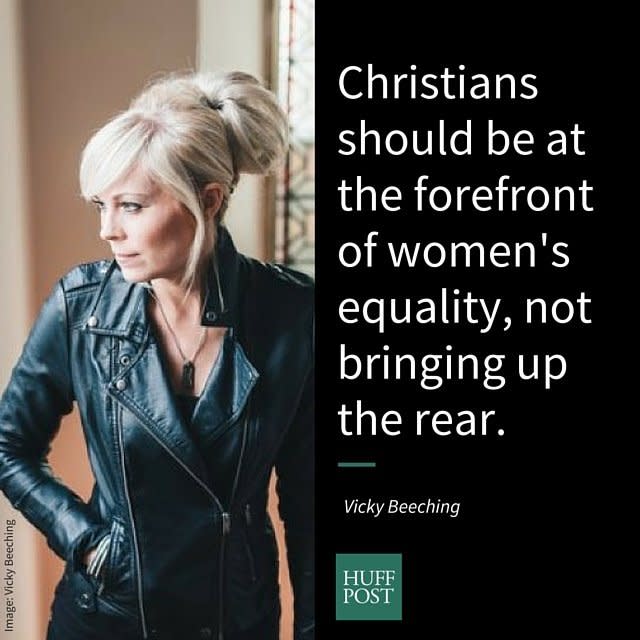
"To me, feminism means championing the rights and equality of women. Jesus treated women in ways that were truly radical for his era, so I've argued for years that Christ should be considered a feminist. The church has seemed afraid of the feminist movement, unsettled by it somehow; branding it as harsh and shrill. That seems bizarre as Christians should be at the forefront of women's equality, not bringing up the rear! Many denominations still don't let women preach, become Elders, or get ordained, so there's much work to be done. 'Christian feminism' is not an oxymoron; it's a deeply compatible, healthy response to the injustices that still exist within the faith community."
Gail Song Bantum
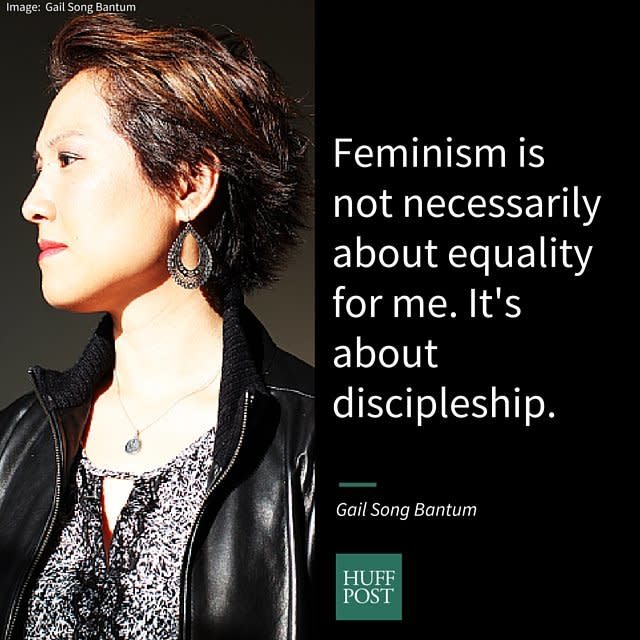
"Feminism cannot merely be an idea but a life embodied. For those of us women who have fought to live out our call in spaces of leadership within the church, we embody feminism daily whether we realize it or not. Any embrace of feminism within the church must be rooted in our deep conviction that we are all created to be free -- that it was for freedom that Christ set us free (Galatians 5:1). It is a desire for this freedom to emerge from the truth that both women and men are created fully and wholly as image bearers of God. In that sense, feminism is not necessarily about equality for me. It's about discipleship - about honoring the creativity of God in our midst, about enabling others to flourish, about fighting for another's freedom, and about submitting to the truth that we have all been gifted this breath each waking moment of the day."
Rev. Dr. Paula Stone Williams
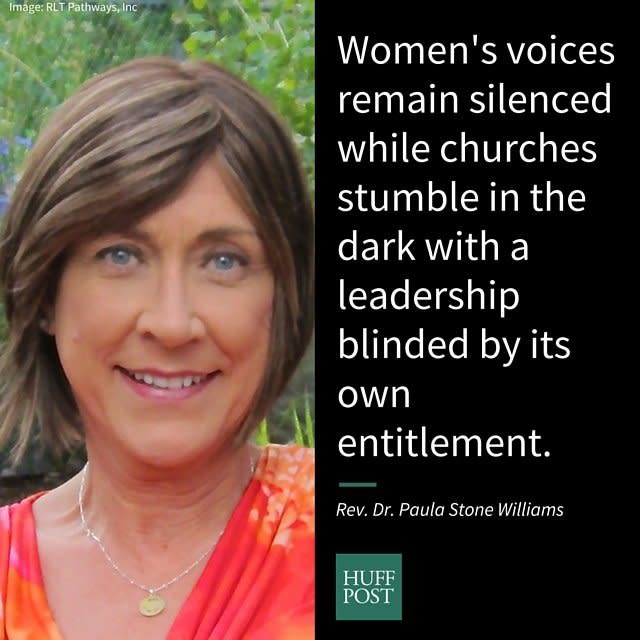
"I have preached in three of the twelve largest churches in America. Today I would not be allowed in the pulpit of a single one. Not only would I be barred because I am transgender, I would be barred because I am a woman. The irony is the things I know now make me twice the person I was before. But women's voices remain silenced while churches stumble in the dark with a leadership blinded by its own entitlement. It has made me into something I never expected I'd be -- a feminist."
Edyka Chilomé

"As a woman of color I don't identify as a feminist although I walk in solidarity with my feminist sisters and am working toward similar goals of transformative justice. I grew up in a christian context that inherited liberation theology born from third world liberation struggles and the continuous survival of indigenous mestizo peoples in the global south. My Christianity looked like rallies at the capital Sunday morning led by indigenous mestiza women who made very clear for me that God, in whatever form, is calling us to walk with the earth’s people and honor life first. This means that the world is my parish, and at the end of the day, compassion and accountability go hand and hand."
Mica McGriggs
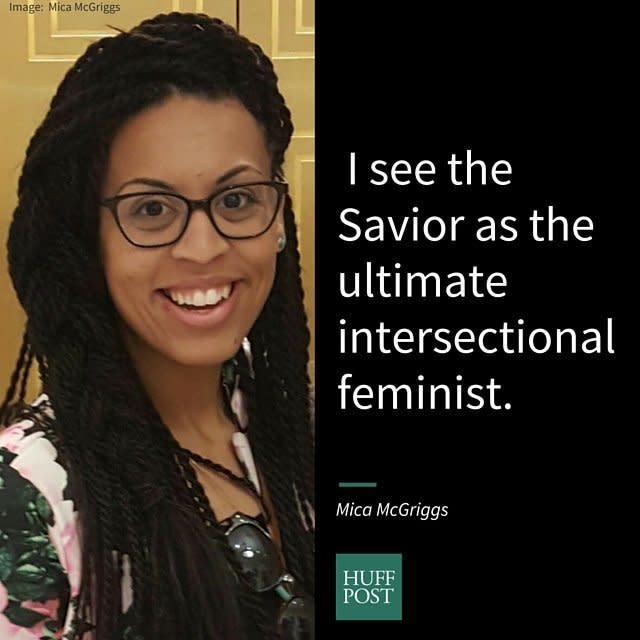
"Feminism for me as a Christian means I am working toward being more like Christ; I see the Savior as the ultimate intersectional feminist. He was always concerned and working for 'the least of these' he looked to the margins and created spaces that were inclusive to all. That is what intersectional feminism aims to do. The church would be a safer and more loving environment for all God's children if they were to embrace liberation theology and the practice of intersectional feminism."
Rev. Christine Lee
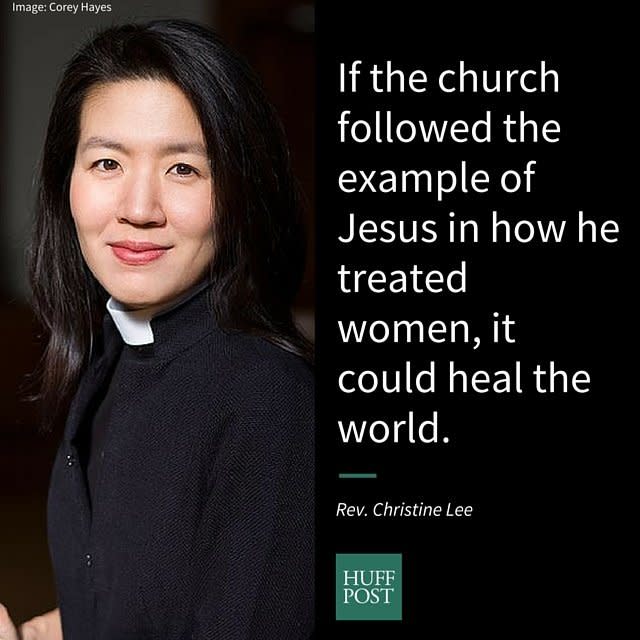
"As a Christian, to me feminism is about seeing and valuing women as Jesus did. I'm always moved by the stories of Jesus' interactions with women in the gospels. In a time and culture where women were often invisible, he saw them and treated them as ones who were honored by God and deeply loved. If the church followed the example of Jesus in how he treated women, it could heal the world. Just like the human body, the whole flourishes when every part is made stronger."
Nicole M. Garcia
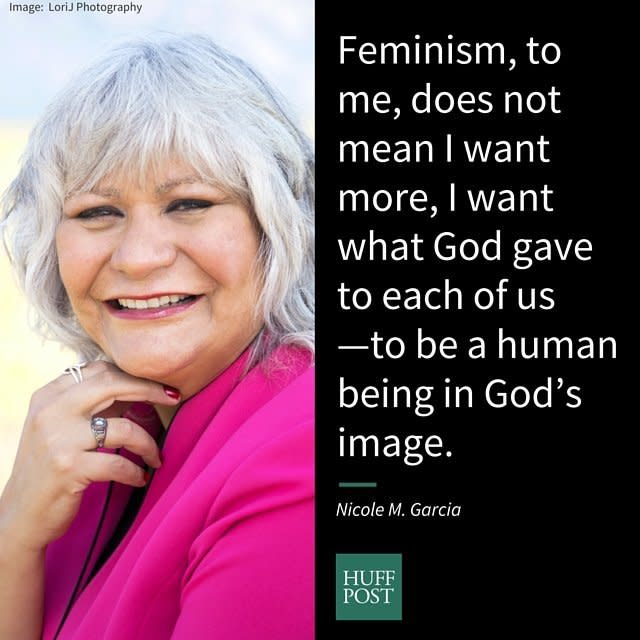
"Genesis 1: 27 is very clear: God made humankind in God’s image. Feminism, to me, does not mean I want more, I want what God gave to each of us -- to be a human being in God’s image. The church has subjugated women far too long and it is time to emphasize the love and compassion Jesus taught us in the Gospel."
Bishop Minerva G. Carcaño
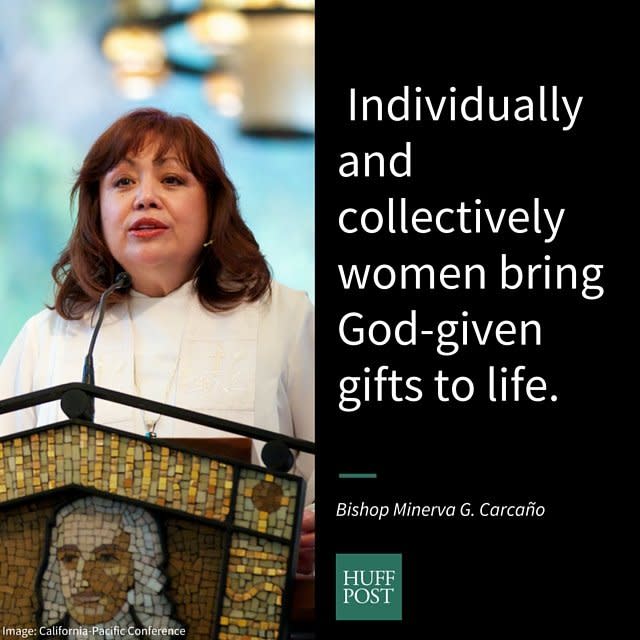
"As a Christian, I view feminism as a commitment to women having the opportunity to fully be who God created us to be. Creation itself allows us to catch a glimpse of God’s amazing creativity with all its beauty, potential and interrelationship. Individually and collectively women bring God-given gifts to life. The church has a responsibility to remind the world of the sacredness of all life including that of women. When women suffer because of discrimination due to their gender, everyone suffers through the loss of the gifts women bring to the world."
Monica A. Coleman

"For me, feminism in religion is about voice and power. It's about what I notice and what kinds of questions I ask: Where are the women in the story? Who has voice? Who doesn't? What might she have said? Who is in leadership in churches? Whose voices and perspectives have the loudest voice and influence? I try to answer these questions when I preach and teach. I want them to feel natural to my daughter's faith."
Rev. Winnie Varghese
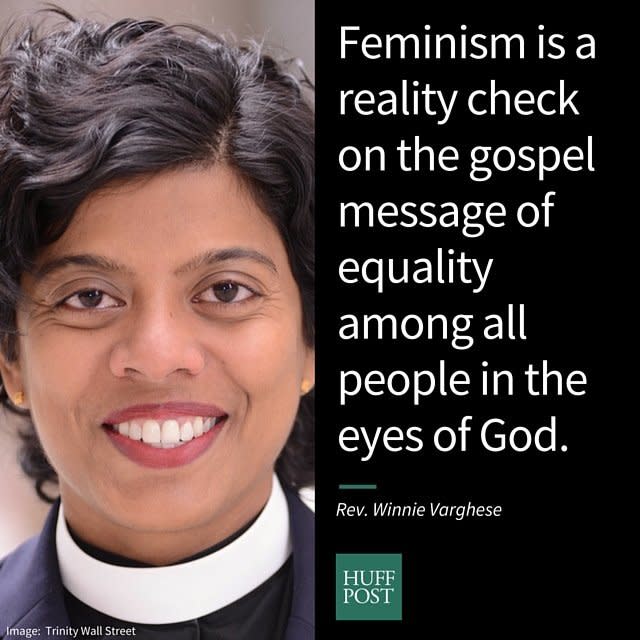
"As a Christian, feminism is a reality check on the gospel message of equality among all people in the eyes of God. If we believe we are equal in the eyes of God, we have to work to make that equality a reality in the world we live in. This has implications both for how girls and women understand their full humanity and dignity and how people of all genders understand the worth and dignity of women, which the church has historically profoundly influenced negatively."
Kate Kelly
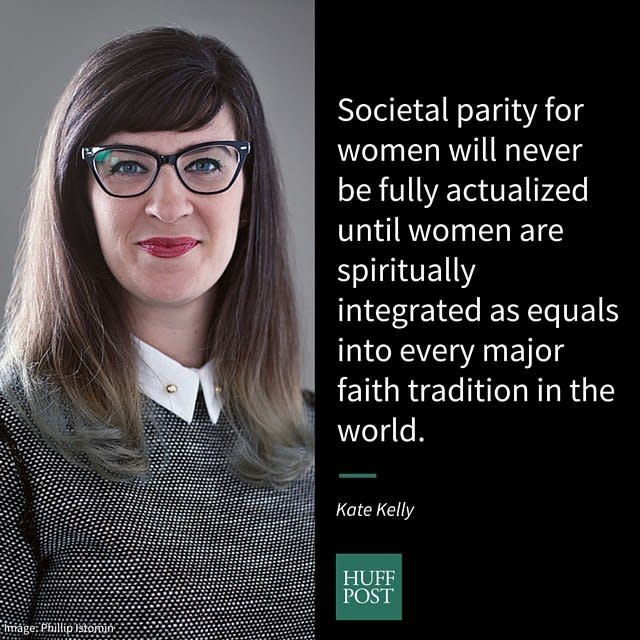
"In my home state of Utah, policy is heavily influenced by the Church of Jesus Christ of Latter-day Saints, which is an extremely patriarchal religion. Any Church that excludes women from leadership roles is clearly missing out on 50 percent of the potential, talents and wisdom of its adherents. But, religious gender discrimination also leaks out of the bounds of the institution and negatively impacts society at large. Utah has one of the largest income gaps between men and women, as well as one of the lowest female college graduation rates. The influence of the religious teachings that put women below men affect not only Mormon women, but all people that live in Utah… Societal parity for women will never be fully actualized until women are spiritually integrated as equals into every major faith tradition in the world."
Emilie M. Townes
![<i>Townes, Dean of Vanderbilt University's Divinity School, preferred to use the word “<a href="http://noteasybeingred.tumblr.com/post/206038114/alice-walkers-definition-of-a-womanist-from-in" target="_blank">womanist</a>,” a phrase coined by poet and activist Alice Walker to embrace the experiences of black feminists. Townes described the term this way: “Womanism is when historic and current insights of Black women are used to eradicate inequalities for all people with a particular focus on class, gender, race, sex and sexuality as social and theological tools to unseat evil.”</i><br /><br />"As a Christian, womanism underscores the power of the gospel working in our lives to set us all free from stereotypes based on gender, sexuality, race, class, physical ability, and all of the ways in which we are humans in God’s creation. Womanism is a spirituality of life that calls me to remember that my life is a gift from God and I should use this gift to work for peace and justice by sharing the good news and to work with others to craft a space and place for folks to thrive. This space and place, to my mind, is the church. It becomes the place that is genuine[ly] involved in being partners with God in bringing in the new heaven and new earth and an embodiment of love, hope, peace, and justice in a world that can use a good dose of each these days."](https://s.yimg.com/ny/api/res/1.2/OQaRo1ArtxbPM5rV6D0jrQ--/YXBwaWQ9aGlnaGxhbmRlcjt3PTk2MA--/https://img.huffingtonpost.com/asset/56faa4391e00009500711902.jpg)
"As a Christian, womanism underscores the power of the gospel working in our lives to set us all free from stereotypes based on gender, sexuality, race, class, physical ability, and all of the ways in which we are humans in God’s creation. Womanism is a spirituality of life that calls me to remember that my life is a gift from God and I should use this gift to work for peace and justice by sharing the good news and to work with others to craft a space and place for folks to thrive. This space and place, to my mind, is the church. It becomes the place that is genuine[ly] involved in being partners with God in bringing in the new heaven and new earth and an embodiment of love, hope, peace, and justice in a world that can use a good dose of each these days."
Gina Messina-Dysert
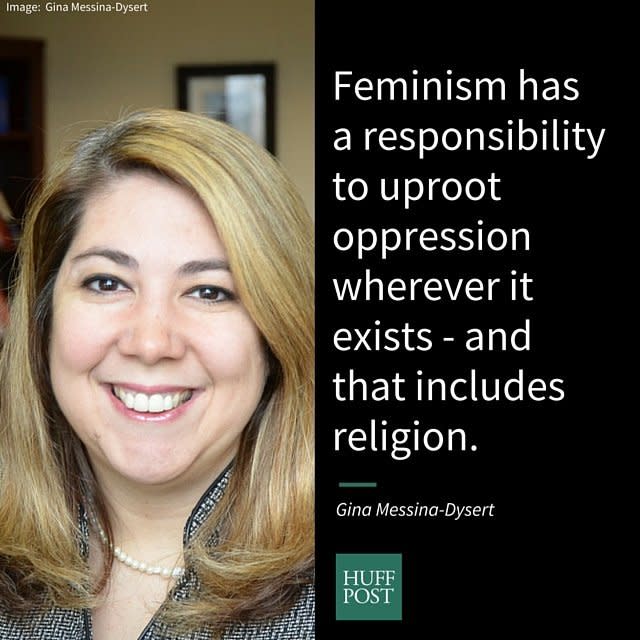
"While many believe the idea of a Christian feminist is an oxymoron, in truth, feminism and Christianity have a long history together. Although, many argue to be feminist is not to be Christian or vice versa, in fact, Christianity has feminist value. If we examine the foundation of the tradition, the idea that every person should be liberated and treated justly, this is very much in line with feminist ideals. Nonetheless, patriarchy has resulted in the manipulation of the tradition into one that has been utilized to oppress women. But with that said, feminism has a responsibility to uproot oppression wherever it exists - and that includes religion. And so, as a feminist lens is used to critique patriarchy in all aspects of society; it is critical that feminists continue to apply the same lens to religious traditions."
This article originally appeared on HuffPost.

